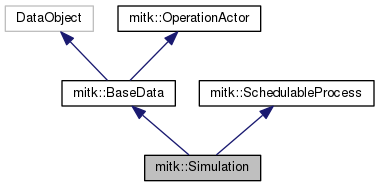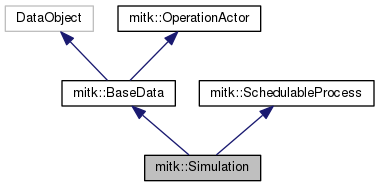|
Medical Imaging Interaction Toolkit
2016.11.0
Medical Imaging Interaction Toolkit
|
|
Medical Imaging Interaction Toolkit
2016.11.0
Medical Imaging Interaction Toolkit
|
#include <mitkSimulation.h>


Public Member Functions | |
| mitkClassMacro (Simulation, BaseData) | |
| Pointer | Clone () const |
| void | Animate () |
| sofa::core::visual::DrawTool * | GetDrawTool () |
| sofa::simulation::Node::SPtr | GetRootNode () const |
| sofa::simulation::Simulation::SPtr | GetSOFASimulation () const |
| void | Reset () |
| bool | GetAnimationFlag () const |
| void | SetAnimationFlag (bool animate) |
| void | SetDt (double dt) |
| void | SetRootNode (sofa::simulation::Node::SPtr rootNode) |
| bool | RequestedRegionIsOutsideOfTheBufferedRegion () override |
| Determine whether the RequestedRegion is outside of the BufferedRegion. More... | |
| void | SetRequestedRegion (const itk::DataObject *) override |
| Set the requested region from this data object to match the requested region of the data object passed in as a parameter. More... | |
| void | SetRequestedRegionToLargestPossibleRegion () override |
| Set the RequestedRegion to the LargestPossibleRegion. More... | |
| void | UpdateOutputInformation () override |
| bool | VerifyRequestedRegion () override |
| Verify that the RequestedRegion is within the LargestPossibleRegion. More... | |
 Public Member Functions inherited from mitk::BaseData Public Member Functions inherited from mitk::BaseData | |
| virtual std::vector< std::string > | GetClassHierarchy () const |
| virtual const char * | GetClassName () const |
| const mitk::TimeGeometry * | GetTimeGeometry () const |
| Return the TimeGeometry of the data as const pointer. More... | |
| const mitk::TimeGeometry * | GetTimeSlicedGeometry () const |
| Return the TimeGeometry of the data as const pointer. More... | |
| mitk::TimeGeometry * | GetTimeGeometry () |
| Return the TimeGeometry of the data as pointer. More... | |
| const mitk::TimeGeometry * | GetUpdatedTimeGeometry () |
| Return the TimeGeometry of the data. More... | |
| const mitk::TimeGeometry * | GetUpdatedTimeSliceGeometry () |
| Return the TimeGeometry of the data. More... | |
| virtual void | Expand (unsigned int timeSteps) |
| Expands the TimeGeometry to a number of TimeSteps. More... | |
| const mitk::BaseGeometry * | GetUpdatedGeometry (int t=0) |
| Return the BaseGeometry of the data at time t. More... | |
| mitk::BaseGeometry * | GetGeometry (int t=0) const |
| Return the geometry, which is a TimeGeometry, of the data as non-const pointer. More... | |
| void | UpdateOutputInformation () override |
| Update the information for this BaseData (the geometry in particular) so that it can be used as an output of a BaseProcess. More... | |
| void | CopyInformation (const itk::DataObject *data) override |
| Copy information from the specified data set. More... | |
| virtual bool | IsInitialized () const |
| Check whether the data has been initialized, i.e., at least the Geometry and other header data has been set. More... | |
| virtual void | Clear () |
| Calls ClearData() and InitializeEmpty();. More... | |
| virtual bool | IsEmptyTimeStep (unsigned int t) const |
| Check whether object contains data (at a specified time), e.g., a set of points may be empty. More... | |
| virtual bool | IsEmpty () const |
| Check whether object contains data (at least at one point in time), e.g., a set of points may be empty. More... | |
| void | ExecuteOperation (Operation *operation) override |
| overwrite if the Data can be called by an Interactor (StateMachine). More... | |
| virtual void | SetGeometry (BaseGeometry *aGeometry3D) |
| Set the BaseGeometry of the data, which will be referenced (not copied!). Assumes the data object has only 1 time step ( is a 3D object ) and creates a new TimeGeometry which saves the given BaseGeometry. If an TimeGeometry has already been set for the object, it will be replaced after calling this function. More... | |
| virtual void | SetTimeGeometry (TimeGeometry *geometry) |
| Set the TimeGeometry of the data, which will be referenced (not copied!). More... | |
| virtual void | SetClonedGeometry (const BaseGeometry *aGeometry3D) |
| Set a clone of the provided TimeGeometry as TimeGeometry of the data. Assumes the data object has only 1 time step ( is a 3D object ) and creates a new TimeGeometry. If an TimeGeometry has already been set for the object, it will be replaced after calling this function. More... | |
| virtual void | SetClonedTimeGeometry (const TimeGeometry *geometry) |
| Set a clone of the provided TimeGeometry as TimeGeometry of the data. More... | |
| virtual void | SetClonedGeometry (const BaseGeometry *aGeometry3D, unsigned int time) |
| Set a clone of the provided geometry as BaseGeometry of a given time step. More... | |
| mitk::PropertyList::Pointer | GetPropertyList () const |
| Get the data's property list. More... | |
| void | SetPropertyList (PropertyList *propertyList) |
| Set the data's property list. More... | |
| mitk::BaseProperty::Pointer | GetProperty (const char *propertyKey) const |
| Get the property (instance of BaseProperty) with key propertyKey from the PropertyList, and set it to this, respectively;. More... | |
| void | SetProperty (const char *propertyKey, BaseProperty *property) |
| virtual void | SetOrigin (const Point3D &origin) |
| Convenience method for setting the origin of the BaseGeometry instances of all time steps. More... | |
| itk::SmartPointer< mitk::BaseDataSource > | GetSource () const |
| Get the process object that generated this data object. More... | |
| unsigned int | GetTimeSteps () const |
| Get the number of time steps from the TimeGeometry As the base data has not a data vector given by itself, the number of time steps is defined over the time sliced geometry. In sub classes, a better implementation could be over the length of the data vector. More... | |
| virtual unsigned long | GetMTime () const override |
| Get the modified time of the last change of the contents this data object or its geometry. More... | |
| virtual void | Graft (const DataObject *) override |
 Public Member Functions inherited from mitk::OperationActor Public Member Functions inherited from mitk::OperationActor | |
| itkTypeMacroNoParent (OperationActor) virtual ~OperationActor() | |
 Public Member Functions inherited from mitk::SchedulableProcess Public Member Functions inherited from mitk::SchedulableProcess | |
| SchedulableProcess (int priority=0) | |
| virtual | ~SchedulableProcess () |
| int | GetPriority () const |
| boost::chrono::nanoseconds | GetTotalElapsedTime () const |
| void | ResetTotalElapsedTime (boost::chrono::nanoseconds carryover=boost::chrono::nanoseconds::zero()) |
| boost::chrono::nanoseconds | GetElapsedTime () const |
Static Public Member Functions | |
| static Pointer | New () |
 Static Public Member Functions inherited from mitk::BaseData Static Public Member Functions inherited from mitk::BaseData | |
| static const char * | GetStaticNameOfClass () |
Additional Inherited Members | |
 Public Types inherited from mitk::BaseData Public Types inherited from mitk::BaseData | |
| typedef BaseData | Self |
| typedef itk::DataObject | Superclass |
| typedef itk::SmartPointer< Self > | Pointer |
| typedef itk::SmartPointer< const Self > | ConstPointer |
 Protected Member Functions inherited from mitk::BaseData Protected Member Functions inherited from mitk::BaseData | |
| BaseData () | |
| BaseData (const BaseData &other) | |
| ~BaseData () | |
| virtual void | InitializeTimeGeometry (unsigned int timeSteps=1) |
| Initialize the TimeGeometry for a number of time steps. The TimeGeometry is initialized empty and evenly timed. In many cases it will be necessary to overwrite this in sub-classes. More... | |
| virtual void | InitializeTimeSlicedGeometry (unsigned int timeSteps=1) |
| Initialize the TimeGeometry for a number of time steps. The TimeGeometry is initialized empty and evenly timed. In many cases it will be necessary to overwrite this in sub-classes. More... | |
| virtual void | ClearData () |
| reset to non-initialized state, release memory More... | |
| virtual void | InitializeEmpty () |
| Pure virtual; Must be used in subclasses to get a data object to a valid state. Should at least create one empty object and call Superclass::InitializeTimeGeometry() to ensure an existing valid geometry. More... | |
| virtual void | PrintSelf (std::ostream &os, itk::Indent indent) const override |
 Protected Member Functions inherited from mitk::SchedulableProcess Protected Member Functions inherited from mitk::SchedulableProcess | |
| void | SetElapsedTime (boost::chrono::nanoseconds elapsedTime) |
 Protected Attributes inherited from mitk::BaseData Protected Attributes inherited from mitk::BaseData | |
| bool | m_LastRequestedRegionWasOutsideOfTheBufferedRegion |
| unsigned int | m_SourceOutputIndexDuplicate |
| bool | m_Initialized |
Definition at line 28 of file mitkSimulation.h.
| void mitk::Simulation::Animate | ( | ) |
Definition at line 45 of file mitkSimulation.cpp.
| Pointer mitk::Simulation::Clone | ( | ) | const |
| bool mitk::Simulation::GetAnimationFlag | ( | ) | const |
Definition at line 82 of file mitkSimulation.cpp.
| sofa::core::visual::DrawTool * mitk::Simulation::GetDrawTool | ( | ) |
Definition at line 57 of file mitkSimulation.cpp.
| sofa::simulation::Node::SPtr mitk::Simulation::GetRootNode | ( | ) | const |
Definition at line 62 of file mitkSimulation.cpp.
Referenced by mitk::SimulationVtkMapper3D::ApplySimulationProperties(), mitk::SimulationVtkMapper3D::GenerateDataForRenderer(), and mitk::SimulationVtkMapper3D::SetDefaultProperties().
| sofa::simulation::Simulation::SPtr mitk::Simulation::GetSOFASimulation | ( | ) | const |
Definition at line 67 of file mitkSimulation.cpp.
| mitk::Simulation::mitkClassMacro | ( | Simulation | , |
| BaseData | |||
| ) |
|
static |
Referenced by mitk::SimulationIO::Read().
|
overridevirtual |
Determine whether the RequestedRegion is outside of the BufferedRegion.
This method returns true if the RequestedRegion is outside the BufferedRegion (true if at least one pixel is outside). This is used by the pipeline mechanism to determine whether a filter needs to re-execute in order to satisfy the current request. If the current RequestedRegion is already inside the BufferedRegion from the previous execution (and the current filter is up to date), then a given filter does not need to re-execute
Implements mitk::BaseData.
Definition at line 106 of file mitkSimulation.cpp.
| void mitk::Simulation::Reset | ( | void | ) |
Definition at line 72 of file mitkSimulation.cpp.
| void mitk::Simulation::SetAnimationFlag | ( | bool | animate | ) |
Definition at line 89 of file mitkSimulation.cpp.
| void mitk::Simulation::SetDt | ( | double | dt | ) |
Definition at line 95 of file mitkSimulation.cpp.
|
overridevirtual |
Set the requested region from this data object to match the requested region of the data object passed in as a parameter.
This method is implemented in the concrete subclasses of BaseData.
Implements mitk::BaseData.
Definition at line 111 of file mitkSimulation.cpp.
|
overridevirtual |
Set the RequestedRegion to the LargestPossibleRegion.
This forces a filter to produce all of the output in one execution (i.e. not streaming) on the next call to Update().
Implements mitk::BaseData.
Definition at line 115 of file mitkSimulation.cpp.
| void mitk::Simulation::SetRootNode | ( | sofa::simulation::Node::SPtr | rootNode | ) |
Definition at line 101 of file mitkSimulation.cpp.
|
override |
Definition at line 119 of file mitkSimulation.cpp.
References max(), min(), and mitk::Geometry3D::New().
|
overridevirtual |
Verify that the RequestedRegion is within the LargestPossibleRegion.
If the RequestedRegion is not within the LargestPossibleRegion, then the filter cannot possibly satisfy the request. This method returns true if the request can be satisfied (even if it will be necessary to process the entire LargestPossibleRegion) and returns false otherwise. This method is used by PropagateRequestedRegion(). PropagateRequestedRegion() throws a InvalidRequestedRegionError exception if the requested region is not within the LargestPossibleRegion.
Implements mitk::BaseData.
Definition at line 166 of file mitkSimulation.cpp.